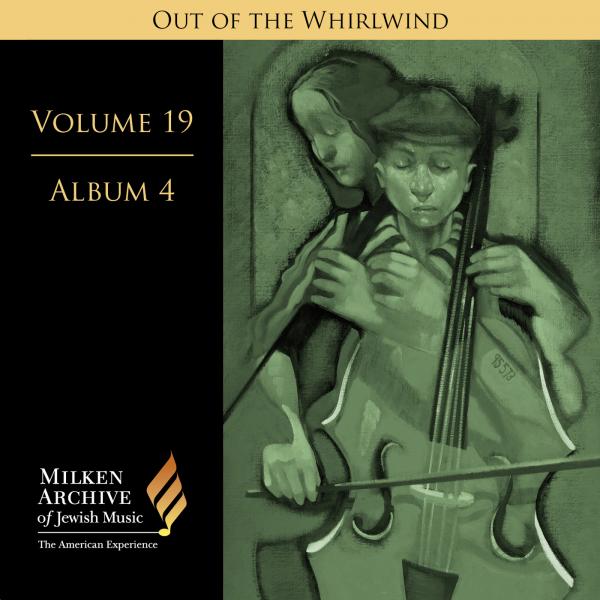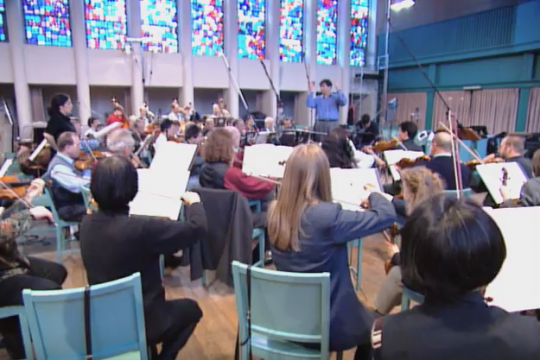Tracks
Liner Notes
Stock’s dramatic cantata for mezzo-soprano and chamber orchestra, A Little Miracle, has been described by its librettist, Bess Weldon, as an “operatic monodrama.” The story is her own creation, but it plays out against the very real and familiar theme of parent and child hiding and attempting to escape during the German war of annihilation against Europe’s Jews. Here, the tale is woven around the dual miracle of birth itself and of survival through the faith and courage sustained by the memory of a mother’s song.
Before the war, Tova and her husband, Yaakov, lived in a town somewhere in Poland, sharing their living quarters with her parents. When the Germans forced the Jewish population into one of the ghettos they constructed as concentration depots for ultimate deportation to the camps, her father refused to go, preferring to remain behind and face certain death. In the cramped quarters of the ghetto, Tova gives birth to Rosa—her “little miracle”—in the midst of the surrounding “decay and destruction,” which is punctuated by the sound of nightly gunshots. With simplicity and judicious economy, the libretto describes the deteriorating situation in the ghetto as fellow Jews are murdered and as the population dwindles with the deportations. Apparently knowing that their turn is imminent, Tova, Yaakov, and their baby, together with her mother, Berta, hide at first in a closet [cupboard]. But as Yaakov and Berta make preparations for the family’s escape, they are shot. Tova manages to flee with Rosa to an apparently prearranged location, where the two are hidden in a stifling farmhouse basement—presumably by local partisans or members of the Polish underground resistance who are willing to hide Jews. During that virtual imprisonment, when they could be discovered at any moment, Tova is sustained only by her recollection and repetition of a Yiddish lullaby that her mother sang to her as a child. The song calms her and her child and gives her courage to continue eluding her pursuers and ultimately to survive. And Tova credits the song—and its embodiment of her murdered mother’s spirit—with saving her and Rosa: “I am saved by a miracle, a simple song.”
Commissioned by the Mary Flagler Cary Trust, Stock composed A Little Miracle expressly for mezzo-soprano Vivica Genaux, with whom he had worked during her student days at Duquesne University. She sang its premiere at Lincoln Center in New York in 1999 with the New York Chamber Orchestra, conducted by Gerard Schwarz.
Stock, having determined that he wanted to write a Holocaust-related piece, discussed some ideas with Bess Weldon—an actress, writer, drama teacher (at Vassar College since 1997), and close friend of his daughter Rachel Stock Spilker (now a cantor in St. Paul, Minnesota, as is his daughter Sara Stock Mayo in Pittsburgh and his son, Jeffrey, in Haverhill, Massachusetts). “I told her what kind of work I wanted to write,” he later recalled, “and within a few days she had devised the general story plan.” Weldon’s text was then inspired by actual stories of Holocaust survivors, as well as by related fiction and poetry. “Her writing was so inspiring,” says Stock, “that the music seemed to compose itself.” The events of the story are related by Tova as a first-person narrator, but, where indicated, she also sings in the name of her mother and her young daughter. A Little Miracle is dedicated jointly to those who were murdered by the Germans and to those who survived.
Lyrics
PROLOGUE
TOVA
You’ll ask me how I made it through, how I survived.
If you have courage, that’s what you’ll ask.
How was I different, what was my secret?
Then I’ll ask you, “Do you believe in miracles?”
It’s a very Jewish thing to answer a question with another question!
You may not know what you believe.
Then I’ll tell you, “I was saved by a miracle. I was saved by a song.”
SCENE 1
TOVA
We were an ordinary family—a father, a mother, and a daughter.
Our house in Poland was quite modest. We wore simple clothes.
On the outside there was nothing remarkable about us.
But inside our ordinary house we lived in splendor because my mother had a beautiful voice and loved to sing.
Not just on Shabbat or the holidays, but all the time.
Even now, when it’s difficult to remember her face, I hear her voice and I recall the very first song she sang to me.
shlof mayn kind,
mayn sheyne kleyne meydele.
zingen vel ikh dir a kleyn lid.
shlof mayn feygele,
makh tsu dayn eygele.
dayne mamele iz do mit dir.
shlof mayn kindele
mayn shtile lindele,
dayne mamele iz do mit....
[Sleep my child,
my pretty little girl.
I will sing to you a little song.
Sleep my little bird;
close your little eyes.
Your mother is here with you.
Sleep my little child
my quiet little gentle one
your mother is here with...]
TOVA
When we are forced to move into the ghetto,
Papa refuses to leave our house.
My husband, Yaakov, and I beg him.
Papa, staying behind is certain death.
Only my mother understands.
Your Papa’s heart is broken.
Do not ask him. Do not demand.
shlof mayn kind....
Mama, it just can’t be that simple.
I sob and hold my father’s hand.
She pulls me away and with a single tear kisses my father good-bye.
We walk out of our ordinary house forever.
The three of us move into a tiny room.
A sink. A stove. A table. A chair.
I don’t despair.
I know my mother can transform this wretchedness with her song.
I know her voice can erase the grayness and the filth.
I know that music can ease the pain.
Two weeks pass, two endless weeks.
Mama no longer sings.
On Friday night, I’m sure at sundown I will hear the blessings rise and soar from Mama’s lips.
BERTA (She mimes covering her head and lighting the candles. In a low, steady voice she speaks.)
barukh ata adonai
eloheinu melekh ha’olam
asher kid’shanu b’mitzvotav v’tzivanu
l’hadlik ner shel shabbat.
[You are worshipped, O Lord, our God,
King of the universe, who has made us holy
through His commandments, and who has
commanded us to kindle the Sabbath lights.]
Translation: Rabbi Morton M. Leifman
TOVA
Sing, Mama, sing. I need to hear the music.
BERTA
My little one, I am not like your father.
I can live with a broken heart, but I cannot sing with one.
SCENE 2
TOVA
I am feeling sick. It might be the room.
It might be the water. I miss my father.
Yaakov holds me and tells me that we’re lucky we’re alive.
I hear the gunshots each night.
Mama doesn’t even hum while she mends her apron.
And then it hits me. How could it be possible?
A new life amongst this decay and destruction?
A new life? Inside me? I see it grow before my eyes.
A little miracle.
If only Papa were here.
SCENE 3
TOVA
I squeeze Yaakov’s hand.
He wipes my forehead.
He is more nervous than I.
Mama calls out orders and prayers.
How can a new life start here?
I yowl with pain. I push to exhaustion.
SCENE 4
TOVA
Yaakov, my love, your smile can’t hide your thoughts.
They are the same as mine. In four long years inside these walls you think I can’t read your mind?
How can we keep our child alive?
She is so tiny, a china doll.
I watch her play, and for a moment I can feel that everything is fine.
But you don’t work; Mama doesn’t sing;
I don’t sleep.
Did you hear the screams last night?
Look out the window. All the neighbors gone.
Rosa could use that blanket in the street.
Don’t look at me that way.
I know it’s shameful, but things are getting worse.
SCENE 5
TOVA
Quiet, little one, be a good girl.
Rest your head against me. Try to sleep.
Whatever happens, just be quiet.
Don’t worry, I am here with you.
There’s lots of room for us in this cupboard.
You’ll share your hiding place with me.
It’s just like hide-and-seek. Quiet now, not a sound.
Papa and Bobbe are packing; we’re going on a trip.
Don’t let the shouting bother you.
Cover your eyes.
Bury your head beneath my shawl.
Listen to my heartbeat; never mind the noises outside.
How can this be happening?
Hiding in a cupboard as the shots ring out.
Yaakov dead in the chair.
Mama dead on the floor.
I never got to say good-bye.
No time for feelings now; let’s wipe away the tears.
Never let my little one see the pain.
Listen, Rosa, all the noises are gone.
Don’t worry. I am here with you.
Everything is quiet, no voices in the street.
It’s time for us to go away.
No time to look back.
Mama dead on the floor.
No time to think back
Yaakov slumped in a chair.
SCENE 6
TOVA
Crawl out now, little one, we’re safe here in the dark.
Take my hand; we only have a little way to go. Here’s the big tree and the fork in the path, just like Yaakov told me.
Look ahead, there’s the farmhouse with the candle burning bright.
This is the place, the place where we will stay.
Be a good girl for just a few steps more.
I knock three times on the farmhouse window.
A door inches open. We step inside.
Down stairs to the basement.
I barely see the face of our guide.
She doesn’t look at us. She says nothing.
A blanket. Two candles. Matches.
A pail of water. A loaf of bread.
She climbs back up the stairs, and the door above clicks shut.
How can I keep my child alive?
I pace the dirt floor.
No sleep. No light.
Tears frozen on my cheeks.
No way of telling night from day.
No sun. No moon.
The outside world is far away.
I hear their footsteps overhead.
I imagine a kitchen, a table, a fireplace, and an oven.
Their lives must be so normal.
The door at the top of the stairs opens, and a hand deposits a few crusts of bread.
I see a thin sliver of light and know it’s morning.
When Rosa hears the steps above, she knows its safe to whisper.
She doesn’t ask what she really wants to know:
Where’s Papa? Where’s Bobbe?
Why did we leave them behind?
Instead she plays with her blanket as if it were her own child.
ROSA
Don’t be frightened, little one.
Your mama’s here with you.
TOVA
Damp and cold surround me.
There’s no air left to breathe.
Legs collapse, sprawled flat on the ground.
Pull the shawl tighter; nothing stops the shaking.
Fever hot on my brow. Rosa’s voice dark and muffled.
Panicked whispers in my ear.
ROSA
Mama, what’s wrong? Mama, please get up.
Stop it, Mama. Please. You’re scaring me.
TOVA
No strength to reach for her. No way to comfort her.
Waves of heat, waves of pain.
Drowning deep as darkness closes in.
No one can save me.
No strength is left to fight.
I don’t sleep, yet I dream.
Hallucinations fill my mind.
Suddenly I feel Mama’s hand on my forehead, wiping away the pain.
A ghost, a vision, singing sweetly to me.
Mama, I hear your voice, your healing voice.
You’re singing for me like long ago.
Wrap me in the blanket, wrap me in your song.
The heaviness is lifting. Your voice is growing strong.
Keep singing. Mama, keep singing.
How can it be that you’re here with me?
I see Mama’s eyes in Rosa’s smiling face.
I feel Mama’s soothing touch in Rosa’s hand.
I hear Mama’s gentle voice in Rosa’s whispered song.
I am saved by Mama’s spirit.
I am saved by my own child.
I am saved by a miracle, a simple song.
EPILOGUE
TOVA
Perhaps you don’t believe my story.
How could a lullaby work such magic?
How could a tiny child know how to heal?
A miracle, that’s the only explanation.
Just what else could it be?
A little miracle.
Credits
Composer: David StockPerformers: Rundfunk-Sinfonieorchester Berlin; Gerard Schwarz, Conductor; Elizabeth Shammash, Mezzo-soprano
Publishers: Norruth Music, Inc. and MMB Music Publishing Inc.
Original story by Bess Weldon (b. 1969), based on various historical accounts.


